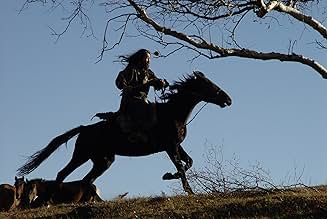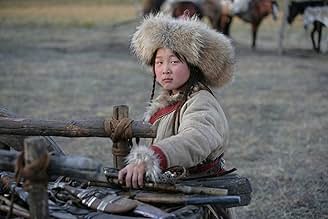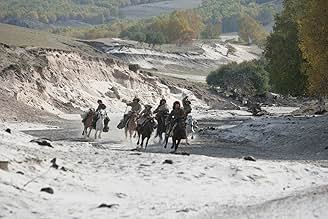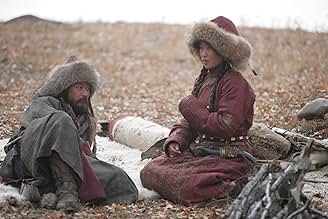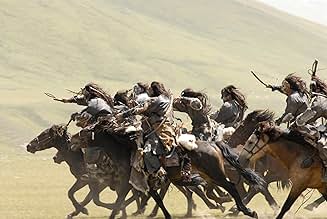PUNTUACIÓN EN IMDb
7,2/10
50 mil
TU PUNTUACIÓN
Los primeros años de la vida de Gengis Kan, que fue esclavo antes de conquistar medio mundo en 1206.Los primeros años de la vida de Gengis Kan, que fue esclavo antes de conquistar medio mundo en 1206.Los primeros años de la vida de Gengis Kan, que fue esclavo antes de conquistar medio mundo en 1206.
- Nominado para 1 premio Óscar
- 16 premios y 13 nominaciones en total
Baasanjav Mijid
- Esugei - Temudjin's Father
- (as Ba Sen)
Ayuur
- Sorgan-Shira
- (as A You Er)
Huntun Batu
- Altan
- (as Hong Jong Ba Tu)
Deng Ba Te Er
- Daritai
- (as E Er Deng Ba Te Er)
Su Ya La Su Rong
- Girkhai
- (as Su You Le Si Ren)
Argumento
¿Sabías que...?
- CuriosidadesDirector Sergei Bodrov and Production Designer Dashi Namdakov visited Mongolia's chief shaman in the capital city of Ulan Bator, so that they could ask permission to film a movie about Genghis Khan's life. The shaman told them that of all the people who have talked about making such a film, they were the only ones to ask his permission.
- PifiasThe Mongolian tribes, including the hordes that conquered their vast empire, rode on a very peculiar race of horses, stocky build, with relatively short legs and a large head. The horses used in the movie look like ordinary western horses
- ConexionesFeatured in The 80th Annual Academy Awards (2008)
- Banda sonoraBeginning
Composed By Tuomas Kantelinen
Performed by Hamburg Film Orchestra, The London Session Orchestra, One Orchestra, Altan Urag
© 2008 X-Filme Creative Pool GmbH.
(p) 2008 Kinofabrika GmbH & Tuomas Kantelinen Ensemble.
Reseña destacada
The first installment of a prospective trilogy, Mongol chronicles the early life of Temudjin, from his childhood on the Asian steppe to his ascension to Khan in 1206.
The performances are passable with special thanks to Honglei Sun, with an engaging turn as Temudjin's long-time friend and ally Jamukha but the film has a rushed quality to it that is predominantly the fault of the screenplay. We jump too quickly from one scene to the next, the tension is constantly disrupted, and the characters are, for the most part, one-dimensional, void of quirks and personal histories and any of the other qualities that might make them relatable. I'm not asking for anything fancy: theirs was a tribal culture constantly engaged in the act of survival, and any philosophical rants or emotive confessionals would feel forced and inorganic, but none of that pardons the film for the simple crime of not giving its characters enough to do. The needs of the plot seem to dictate their actions, rather than the needs of the characters driving the plot.
The biggest casualty, as always, is the love story. Ironically enough, Temudjin and Borte generate the most chemistry when they meet as children, Borte commanding him with a freeness of spirit that gets less and less visible as the movie progresses to pick her as his bride. Unfortunately, their subsequent romance is more about desperate rescues and long-winded goodbyes than it is the simple moments of intimacy that make a relationship believable.
That said, the cinematography is tremendous and the costumes top-notch, and the casting department deserves a couple extra bushels of brownie points for picking actors who unlike many a Hollywood ensemble look like they could actually survive the conditions they supposedly inhabit. The combat scenes are captivating and cleverly shot, and despite the inevitable comparison to such battle-heavy epics as Lord of the Rings and Gladiator, Bodrov keeps a handle on things, never letting any of the battles run beyond the five minute mark, endowing the film with an element of realism and restraint where many of the other so-called epics go completely over the top. True, the movie relies a bit more heavily on CGI than I would prefer, but the Mongolian landscape, the real star of the show, is so gorgeous, so demanding, so jaw-droppingly authentic that we quickly forget our visual grievances and get lost in the rudimentary act of watching.
A pity we can never lose ourselves completely.
The performances are passable with special thanks to Honglei Sun, with an engaging turn as Temudjin's long-time friend and ally Jamukha but the film has a rushed quality to it that is predominantly the fault of the screenplay. We jump too quickly from one scene to the next, the tension is constantly disrupted, and the characters are, for the most part, one-dimensional, void of quirks and personal histories and any of the other qualities that might make them relatable. I'm not asking for anything fancy: theirs was a tribal culture constantly engaged in the act of survival, and any philosophical rants or emotive confessionals would feel forced and inorganic, but none of that pardons the film for the simple crime of not giving its characters enough to do. The needs of the plot seem to dictate their actions, rather than the needs of the characters driving the plot.
The biggest casualty, as always, is the love story. Ironically enough, Temudjin and Borte generate the most chemistry when they meet as children, Borte commanding him with a freeness of spirit that gets less and less visible as the movie progresses to pick her as his bride. Unfortunately, their subsequent romance is more about desperate rescues and long-winded goodbyes than it is the simple moments of intimacy that make a relationship believable.
That said, the cinematography is tremendous and the costumes top-notch, and the casting department deserves a couple extra bushels of brownie points for picking actors who unlike many a Hollywood ensemble look like they could actually survive the conditions they supposedly inhabit. The combat scenes are captivating and cleverly shot, and despite the inevitable comparison to such battle-heavy epics as Lord of the Rings and Gladiator, Bodrov keeps a handle on things, never letting any of the battles run beyond the five minute mark, endowing the film with an element of realism and restraint where many of the other so-called epics go completely over the top. True, the movie relies a bit more heavily on CGI than I would prefer, but the Mongolian landscape, the real star of the show, is so gorgeous, so demanding, so jaw-droppingly authentic that we quickly forget our visual grievances and get lost in the rudimentary act of watching.
A pity we can never lose ourselves completely.
- Delmare
- 24 jul 2008
- Enlace permanente
Selecciones populares
Inicia sesión para calificar y añadir a tu lista para recibir recomendaciones personalizadas
Detalles
- Fecha de lanzamiento
- Países de origen
- Idiomas
- Títulos en diferentes países
- Mongol: The Rise of Genghis Khan
- Localizaciones del rodaje
- Inner Mongolia, China(location)
- Empresas productoras
- Ver más compañías en los créditos en IMDbPro
Taquilla
- Presupuesto
- 18.000.000 US$ (estimación)
- Recaudación en Estados Unidos y Canadá
- 5.705.761 US$
- Fin de semana de estreno en EE. UU. y Canadá
- 135.326 US$
- 8 jun 2008
- Recaudación en todo el mundo
- 26.527.510 US$
- Duración2 horas 6 minutos
- Color
- Mezcla de sonido
- Relación de aspecto
- 2.35 : 1
Contribuir a esta página
Sugerir un cambio o añadir el contenido que falta

Principal laguna de datos
What was the official certification given to Mongol (2007) in Brazil?
Responde






